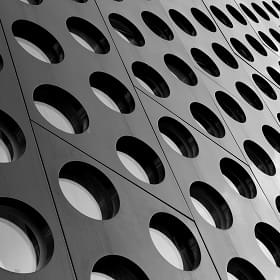Functional micro and nanostructured surfaces of plastics products – New testing and characterization methods
A project financed by the Danish Agency for Science and innovation.
Micro and nanotechnology is no longer just a research area without tangible products. In the plastics industry a series of new manufacturing technologies have made possible the production of new tools and products, where special surface properties and structures on the micro/nano scale enable new and better applications, for example for self-cleaning, energy efficient, durable and weather-resistant surfaces.
Advanced measurement and analysis methods for characterization of these micro and nano production tools as well as the structured plastic surfaces, they produce, are a necessary condition for innovative development and quality assurance of the finished products. Only a few research institutions currently have the necessary characterization equipment, as this is a highly specialized area, which requires specially trained measurement technicians and specialists.
There is, however, an increasing need for the development of characterization methods that can be widely used on all types of products and can support the emerging innovative development.
Especially products and surfaces that are not flat, e.g. convex and concave, are very challenging as existing methods have been developed to measure flat surfaces adopted from the silicon wafer technology.
Characterization of micro- and nanostructures over large areas, or on very large items is also a problem because the techniques are often microscopy based and therefore have a limited ability to handle the large sample sizes that are currently in frequent use in the industry. With a view to addressing problems which restrict the full application potential of micro and nanotechnology, there is a need to further develop the characterization methods and to optimize replication techniques and replication materials. The replication technique is a method that uses a special material to take an impression of a microstructure, which can then be analysed in the lab. In this way it is possible to take an impression of a surface and subsequently analyse the surface in micro scale in the specialized characterization laboratory. The technique is already widely used for metals where, for example, early fatigue cracking can be detected. In the analysis of plastic and composite surfaces, there are special considerations to take in the transfer process with respect to solubility and stress-cracking. Replication techniques right down to nano level is also a challenge with existing replication materials. An additional goal in this project will be to find optimal materials and techniques to solve these problems.
DMN members can read publications about the project in Danish here >
 For further information, please contact:
For further information, please contact:

- Dorte Walzl Bælum
- Network Director
- B.Sc. Chem. Eng., M.Sc. in Business
- M: 60 35 19 90
- E: dwb@dmn-net.com


